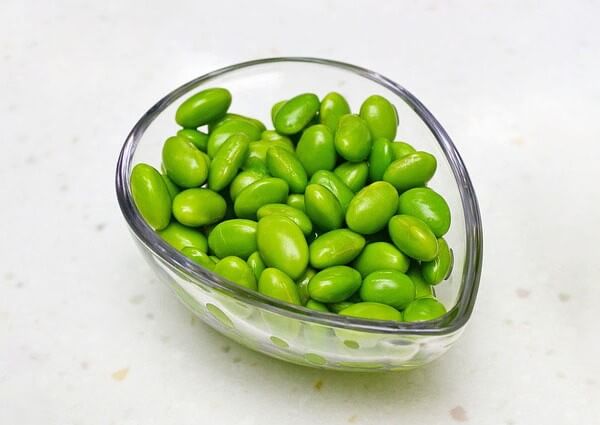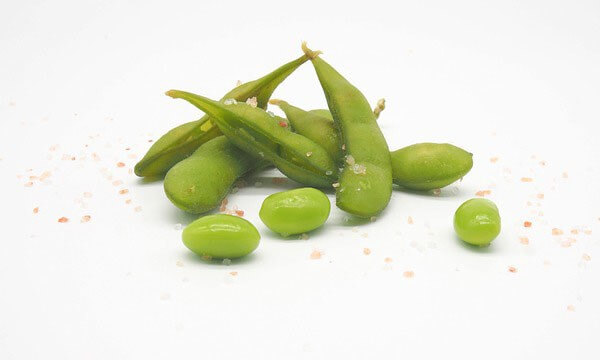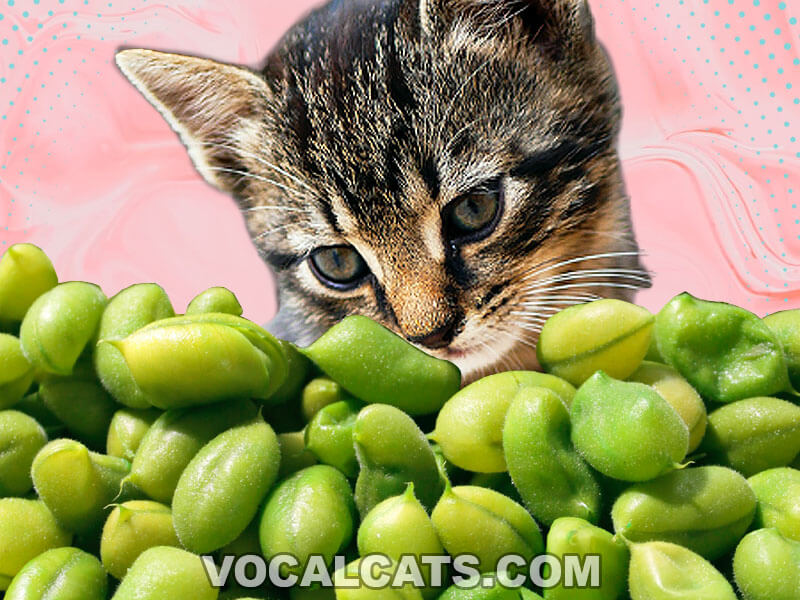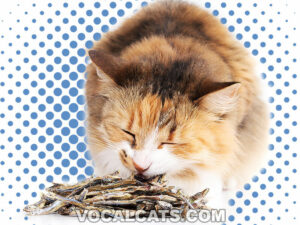Can Cats Eat Edamame? Yes, cats can eat Edamame in small quantities and as an occasional snack. When boiled or steamed, small quantities of Edamame can be a good snack for your cat as it is packed full of fiber, vitamins, antioxidants, and protein. However, uncooked Edamame can cause vomiting, bloating, and diarrhea in cats. So, take extra care when preparing Edamame for cats.
There’s been a surge in people who practice healthy living recently. That’s why we see more food options made of healthy ingredients like Edamame and Brussel Sprouts nowadays, all of which are designed to be tasty snacks that are healthier than your typical options.
And if your cat is begging you while you’re munching on your favorite Edamame snack right now, you’re probably wondering, “Can my cat Eat Edamame?”
While this is a simple question, the answer is quite complicated. Below, we’ll explain whether or not cats can eat Edamame, what Edamame is, and everything you need to know before giving your fuzzy friend a bite of this tasty legume!
Contents
- Can Cats have Edamame?
- What is Edamame?
- What are Edamame beans?
- Is Edamame soy beans?
- Soybean vs Edamame
- Is Edamame good for Cats?
- What are some nutrient benefits of Edamame for cats?
- Is Edamame safe for Cats?
- Is Edamame bad for Cats?
- Is Edamame poisonous to pets?
- Treatments if your cat has Edamame poisoning
- How much Edamame can you give your cat?
- Why does my cat love Edamame?
- How to prepare Edamame for cats
- Feline-friendly snack alternative to Edamame
- Cats and Edamame
- So, can Cats eat Edamame?
- Related Questions
Can Cats have Edamame?

Yes, cats can have Edamame in moderation if it is fully cooked and doesn’t contain any salt or other seasonings.
When you steam or boil Edamame, the beans aren’t toxic to cats, and the high levels of fiber in the bean may also aid their digestive health.
However, it’s important to feed your feline friends small amounts of Edamame depending on their weight, age, and activity levels.
If this will be your fur baby’s first time eating Edamame, ask your vet first for his or her approval. You’ll then want to introduce this legume to your fuzzy friends in small quantity and slowly and gradually.
What is Edamame?

Edamame is a green and immature soybean that’s very popular in Japanese cuisine. These beans are typically cooked and boiled in 4% salt water to add a slight flavor, and can be eaten with stews, salads, or even on their own.
In the United States, many usually purchase these beans frozen and ready for cooking. Small amounts of Edamame can be safe for your cat, but in its raw form, it contains a protein called lectin, which causes various digestive issues in cats.
Keep reading because we will discuss more about this below.
What are Edamame beans?
Edamame beans are basically young and immature soybeans that are sometimes called vegetable-type soybeans. These beans are known for their bright green color, which is very different from their mature counterpart, which is usually beige or light brown.
Just like any soybean, it’s imperative to cook Edamame beans properly as raw soybeans have the lectin protein, which is toxic to humans and cats, causing digestive issues even in small quantities.
Is Edamame soy beans?
Technically, Edamame beans are soybeans, despite the difference in color and flavor. And while they are technically the same bean, there are some key differences between Edamame and mature soybeans that are important to know.
Let’s find out how they are different next.
Soybean vs Edamame
The main difference between Soybean and Edamame is that Soybean is harvested during the mature phase of the bean, while Edamame is harvested at an earlier stage, making it an immature soybean.
Since Edamame is harvested earlier than mature soybeans, they have a much brighter green color.
Additionally, Edamame has a buttery and nutty taste similar to peas, which differs from the taste of mature soy products like tofu and soymilk.
However, like any soybean, proper preparation and cooking of Edamame are absolutely necessary to make it safe for consumption.
RELATED: Can Cats Eat Celery?
Is Edamame good for Cats?
When you give your cat the proper amount and make sure it is cooked properly, Edamame can be a great snack to have occasionally as a rare treat.
While Edamame should not be a mainstay in your cat’s diet, there are some potential health benefits that your cat may receive from consuming Edamame as an occasional treat.
Some of these health benefits include:
- Edamame may help lower cholesterol levels in your cat due to its high fiber levels.
- Edamame can aid in balancing your cat’s nutritional needs as it is enriched with vitamins A, E, and C.
- Cooked Edamame beans contain choline, a nutrient that can support good liver health in cats.
- Edamame supports good bone health and reduces bone loss in cats.
- Edamame contains antioxidants which can boost your cat’s immune system.
What are some nutrient benefits of Edamame for cats?
Edamame is considered a superfood for humans because of all the nutritional benefits it offers. But what some people don’t know is that some of these benefits also extend to cats.
Cats are unique animals with specific dietary needs. However, there are some nutrients in Edamame that can be very beneficial for our four-legged friends, from improving their gut health all the way to boosting their immune system.
Here are some of the nutritional benefits cats may get from eating Edamame in moderation and as a rare occasional treat.
The high fiber in Edamame can lower your cat’s cholesterol
A huge benefit of feeding your cat Edamame is the high fiber in this legume. Cats that have high cholesterol levels must change to a diet that is high in fiber and low in cholesterol.
Additionally, there’s evidence that shows that fiber can also help cats with diabetes. Fiber slows down the absorption of sugars from starches, which stabilizes the cat’s blood sugar levels.
Vitamin A in Edamame improves your cat’s night vision and skin
Edamame is high in vitamin A nutrient that includes retinol and rhodopsin. Rhodopsin is essential for low-light vision, which is why vitamin A supports your cat’s night vision and can promote healthier skin.
READ NEXT: Why Does My Cat Look Out The Window At Night?
However, high levels of vitamin A can be toxic for your cat and cause lethargy and lameness, which is why it’s crucial only to feed your cat Edamame in moderation.
Edamame provides a healthy dose of magnesium to reverse constipation in cats
Cats often find themselves dealing with digestive issues like constipation and urinary disorders.
Supplementing their diet with magnesium can help reverse these symptoms because this mineral plays a crucial role in a cat’s digestion as it produces enzymes in the saliva that help break down food, making it easier to digest.
As a result, they are less likely to suffer from constipation.
Since Edamame can give your cat a boost of magnesium, it could help them with their digestive health.
Calcium in Edamame is essential for healthy bones and teeth in cats
In just 1/3 cup or 85 grams of Edamame, there are 50.2 mg of calcium. As we can see, there are relatively high levels of calcium in Edamame, which cats need for healthier bones and teeth.
When the cat’s body creates new bone tissue, it lays down a collagen framework. From there, calcium from the blood follows the framework and spreads through it, strengthening the bones and facilitating bone growth.
Vitamin E in Edamame promotes healthy coat in felines
Vitamin E is an essential nutrient for cats that they need to support a healthy immune system and to grow a healthier coat.
Vitamin E is the term for the compound groups called tocopherols and tocotrienols, which are natural compounds that come from plants. It can improve the coat by easing itching, which means your cat will scratch less, thereby keeping their coat and skin healthy.
READ ALSO: Do Ragdoll Cats Scratch Furniture?
This vitamin plays a crucial role in forming collagen fibers, which is essential in the growth of hair and skin.
Edamame contains small levels of vitamin E, so it can give your cat a slight boost that can promote a fluffier and healthier coat.
Potassium in Edamame is great for cats with a potassium deficiency
If your cats have a potassium deficiency, they may have low appetite and may not have as much energy.
Potassium is an essential electrolyte found in cat’s blood. This mineral is essential in regulating muscle contractions, nerve impulses, heart function, and more.
When potassium leaves the cell, it restores its repolarization, allowing the muscle to move and contract.
This is why a potassium deficiency can leave your cat lethargic.
The average potassium requirement for cats is 330 mg a day. ⅓ cup of Edamame already contains 410 mg of potassium, which is why Edamame could be a good option if your cat has a potassium deficiency.
Choline in Edamame helps maintain healthy liver in cats
Choline is a methyl donor essential for a cat’s liver health. Cats need methyl donors for a process known as methylation, which modifies the DNA to allow cells to divide and understand which cells to retain.
This process occurs mostly in the liver, which is why choline can greatly aid in a cat’s liver health.
Edamame nutrition facts (⅓ cup or 85 grams)
| Name, Unit | Amount |
| Calories, cal | 90.1 |
| Protein, g | 9 |
| Total Fat, g | 4 |
| Carbohydrate, g | 7 |
| Fiber, g | 4 |
| Sugar, g | 2 |
| Calcium, mg | 50.2 |
| Iron, mg | 1.8 |
| Potassium, mg | 410 |
| Sodium, mg | 5.1 |
As you can see, just 1/3 cup of Edamame or 85 grams of this legume contains 4 grams of fiber, 50.2 mg of calcium, 1.8 mg of iron, and 410 mg of potassium. Therefore, in small amounts, cooked Edamame is safe for your cat.
As you can see, 85 grams of Edamame contains 4 grams of fat. An average 9-pound cat requires a total of 5.64 grams of fat daily, so a serving of Edamame contains over 70% of their daily fat needs.
Therefore, it isn’t a good idea to feed them a lot of Edamame. In addition, 1/3 cup of Edamame also contains 5.1mg of sodium, 2 grams of sugar, and 90 calories. While this doesn’t seem like much to us, it sure is a lot for our fuzzy friends. This is why feeding our little fur baby Edamame in moderation is crucial.
On the flip side, 85 grams of Edamame do contain 4 grams of fiber, 50.2 mg of calcium, and 410 mg of potassium, which can benefit your cat’s general health.
Is Edamame safe for Cats?
Edamame is safe for feline consumption when it is cooked properly and fed to cats in small amounts.
Raw Edamame and store-bought Edamame should not be fed to your fluffy companion because it contains certain compounds like lectin, salt, and garlic flavorings that are toxic to cats.
So if you would like to feed your cat Edamame, make sure to only give them cooked Edamame that is plain without any salt, flavoring, or seasoning.
Is Edamame bad for Cats?
Edamame is not bad for cats if you cook this legume properly and offer it to your cat in small amounts or in moderation.
However, there are quite a few ways Edamame can be bad for your fluffy friends. This is why we urge feline owners to proceed with caution when feeding their cats Edamame.
Some of the reasons you may want to avoid giving your cat Edamame include:
Raw and undercooked Edamame contains lectin which is dangerous to cats
The biggest concern when feeding your cat raw Edamame is that it contains a protein known as lectin. This is present in all soybeans and can be toxic to both cats and humans.
That’s why ingesting a small amount of raw or undercooked Edamame can lead to diarrhea, vomiting, and bloating.
Lectin is sort of like a natural pesticide in plants, so when cats ingest raw Edamame, the lectin protein from this legume enters their bodies and this can result in intestinal issues such as upset stomach, vomiting, and diarrhea, especially in large amounts.
Edamame seasoned with salt can lead to sodium poisoning in cats
When you cook Edamame, the beans are often seasoned with a touch of salt. And with commercial Edamame, this salt content can be a bit higher to make the food tastier.
That said, if the Edamame contains salt, please do not feed it to our fluffy friends.
In general, cats should not have high levels of salt, as just a few grams of salt per kilogram of your cat’s body weight can be toxic. For an average 9-pound cat, the daily recommended salt dosage is 41 mg, so anything more than that can be dangerous.
This means that our fuzzy friends should not consume more salt than they need each day.
Cat that consume too much sodium may experience sodium poisoning. Signs and symptoms of salt toxicity in cats include the following:
- Diarrhea.
- Lethargy.
- Vomiting.
- Decreased appetite.
- Excessive thirst.
- Frequent urination.
- Incoordination.
- Tremors.
- Seizures.
- Coma.
If you notice any of these symptoms in your cat, we highly recommend that you contact your vet immediately. Sodium toxicity requires immediate medical attention and the sooner you act, the better.
There is no single treatment for salt toxicity in cats. However, your vet will likely attempt to slowly restore its hydration and electrolyte levels through IV fluids.
Garlic or onion flavored Edamame is toxic to cats
Certain brands of Edamame are flavored with garlic and onion powder. This is not good for cats because garlic and onion are both poisonous to cats.
These herbs contain compounds that are toxic to cats. They are disulfides and thiosulphates, both of which can lead to hemolytic anemia in cats.
Garlic and onion powder are way more concentrated than raw garlic and onions so they are more dangerous to cats.
Signs and symptoms of garlic or onion poisoning in cats include the following:
- Vomiting.
- Diarrhea.
- Pale gums.
- Restlessness.
- Lethargy.
Consuming large amounts of Edamame can lead to a gastrointestinal upset in cats
Like any treat, moderation is key when feeding your cat Edamame. This isn’t a food that’s part of their natural diet, as these animals are obligatory carnivores.
This means eating too much of a food that isn’t part of their natural diet like Edamame can cause gastrointestinal upset, which has symptoms like vomiting and diarrhea.
Some cats be allergic to Edamame
While it isn’t common, there are some cats that can be allergic to Edamame. So, even if you feed them plain and well-cooked Edamame beans, they may still have an allergic reaction to it.
If your fluffy friend is showing signs and symptoms of Edamame allergy such as constant itching of the face and belly, you’ll want to stop giving him anymore Edamame. We also highly recommend that you contact your veterinarian right away.
Other signs and symptoms of food allergy in cats to watch out for include the following:
- Brittle fur.
- Skin infections.
- Discharge in the eyes, ear, and nose.
- Diarrhea.
- Itching.
- Hair Loss.
- Sneezing.
- Wheezing.
- Coughing.
- Scratching or biting of the skin.
Is Edamame poisonous to pets?
In its raw form, Edamame is dangerous to pets. These beans are basically soybeans, which contain lectin when uncooked or raw.
This is why whenever you or your cat consume any type of soybean, you must cook the beans thoroughly to get rid of the lectin. Once cooked, the Edamame is safe for feline consumption.
Lectin is a plant protein that’s seen as a type of natural pesticide that causes adverse reactions in people that ingest the plant. Even small amounts of lectin ingestion can lead to gastrointestinal issues in your cat.
If your fluffy companions consume raw Edamame in large amounts, it can be fatal.
If you notice changes in behavior after your feline companion consume some Edamame, we strongly advise you to contact your vet right away. This requires immediate medical attention.
Here’s a list of the symptoms to look out for if you suspect that your cat has Edamame poisoning:
- Nausea.
- Vomiting.
- Diarrhea.
- Bloating.
- Lethargy.
- Gas.
- Skin Inflammation.
- Decreased appetite.
- Wheezing.
- Coughing.
If your cat consumed too much Edamame or ingested raw or undercooked Edamame beans, it’s important to keep an eye out for any of the symptoms of Edamame poisoning mentioned above.
If they exhibit any of the above symptoms, call the vet as soon as possible and schedule an appointment immediately. Your vet may ask you to bring your feline friends in for a thorough physical examination. After which, the vet will properly diagnosed the health issues and administer the best treatment option.
As we can see, it is imperative that your fuzzy friends get treatment as soon as possible.
Each case is different, so it’s best to call a veterinary professional who can assess your cat’s situation and determine the best path forward.
Treatments if your cat has Edamame poisoning
If you suspect your cat has Edamame poisoning, your top priority should be to bring them to a veterinary professional. When there’s a professional vet overseeing your cat, there’s a better chance that they will understand how to treat your feline friend’s specific situation.
But while waiting for a vet or your appointment, here are some treatments performed to ease certain Edamame poisoning symptoms in cats.
Vomiting treatment
A common reaction that cats can have when they ingest too much Edamame is vomiting. Typically, veterinarians will prescribe a healthier diet that’s easier for a cat to digest to ease their upset stomach and reduce vomiting.
In severe cases, vets prescribe medications such as maropitant citrate and famotidine, which allows the body’s natural healing mechanisms to take control and correct the problem.
Antiemetic drugs treatment for nausea
When cats experience nausea, the usual treatment that vets prescribe is maropitant, though your vet may also recommend ondansetron. These are antiemetic drugs that are designed to help treat central nausea in felines.
Lethargy
General treatments for lethargic cats usually involve a different diet that contains more fiber and added nutrients.
Sometimes, vets may even recommend a new diet with nutrient supplements to improve your feline companion’s overall health.
If you notice that your cat is feeling lethargic after eating some Edamame, the first step is to remove the food from their reach and then to call your vet and ask ask for their professional advice.
Diarrhea treatment
When your cat has diarrhea, your vet will likely recommend a healthier diet with more fiber to aid their digestion. However, it’s also common for vets to prescribe anti-diarrhea medication along with probiotics to further ease your cat’s stomach.
You may be interested in: Can Cats Eat Dragon Fruit?
How much Edamame can you give your cat?
When giving your cat cooked Edamame, it’s important to look at it as an occasional rare treat.
That’s because Edamame should not be a part of their regular diet and should only be consumed occasionally.
For cats, it’s recommended that treats like Edamame and cat-specific treats only comprise 10% of their diet.
So, if you give your cat Edamame, it’s best to give them one or two at a time and to only give it to them occasionally.
Why does my cat love Edamame?
Every cat is unique and there could be a chance that your feline friends loves the taste of Edamame.
Edamame is generally soft and tender when cooked, which means it’s easy for your cats to chew it.
So, if you notice that your cat enjoys the taste of Edamame, it could also be that they enjoying chewing this legume.
Remember though to only give your cat Edamame occasionally as a rare treat. Moderation is key when feeding your cat Edamame, so only give them one or two small pieces at a time.
How to prepare Edamame for cats
To prepare Edamame for cats you need to boil it first. In its raw form, Edamame contains lectin, which is dangerous to your furry friends. This is why your cat should never eat raw Edamame. And if you’re looking to prepare Edamame properly for your cats, we’ve got you covered.
Check out our step-by-step guide here:
- Step 1: Soak the Edamame in water overnight to soften them.
- Step 2: Add the soaked Edamame to boiling water then boil or steam them for 3 to 4 minutes or until soft and completely cooked.
- Step 3: Discard the Edamame pods and keep the soft Edamame beans (If you bought Edamame beans that are already out of the pod you can skip this step).
- Step 4: Let the Edamame beans cool to room temperature and then feed it to your cat in small portions.
Feline-friendly snack alternative to Edamame
While Edamame is a safe snack for cats when consumed in moderation or in small amounts, it isn’t the best cat treat.
Cats don’t naturally eat Edamame because they are obligate carnivores. So while they can reap in a few health benefits from the vitamins and other nutrients in Edamame, there are other treats that can give them even more benefits.
One of these cat-specific treats is the TEMPTATIONS MIXUPS Crunchy and Soft Cat Treats.
These treats are made with all-natural flavors. Since all the flavorings are natural, there’s a higher chance that your cat will love the taste.
On top of that, the treats only contain 2 calories per treat, so they won’t be as unhealthy as other treats that can have 4 to 5 calories per treat.
These treats were specifically designed for a cat’s digestive system and needs, so it would be a great feline-friendly alternative to Edamame. The treats are nutritionally complete and well-balanced, which is why they are great options for cats.
Cats and Edamame
It’s important to understand the relationship of cats and Edamame before giving this buttery yet nutty legume to your cat.
That way, you understand the potential health risks and benefits as well as the proper way to prepare it before letting your furry friends consume it.
While cats can eat cooked Edamame, they cannot eat the beans raw, and we’ll explain why in the sections below.
Can Cats Eat Edamame beans?
Yes, cats can eat cooked Edamame beans. If you have raw Edamame beans at home, keep it away from your cat and make sure they don’t eat it. This is because raw Edamame beans contain a compound known as lectin, which is a family of proteins usually describes as an “anti-nutrient.”
Anti-nutrients are the complete opposite of a nutrient, as they prevent the absorption of essential minerals like potassium, calcium, iron, and more.
Even a small amount of lectin can severely upset your cat’s stomach, causing problems like vomiting, diarrhea, and bloating. This is why cats should not have Edamame beans.
Can Cats eat Edamame skin?
No, cats should not eat Edamame skin. Just like the raw beans, Edamame skins or husks contain lectin. The skin is also difficult to chew and can be a choking hazard.
So, for your cats safety, make sure you discard the Edamame skin and only allow your four-legged friends to eat the cooked Edamame beans.
Can cats eat cooked Edamame?
Yes, cats can eat cooked Edamame and this is the only type of Edamame your cat can eat.
To cook Edamame for your cat, simply boil or steam it until it is soft.
To make it easier to soften, you can soak the beans in clean water overnight.
Once the Edamame is fully cooked, make sure to not season it, as seasonings like salt and garlic or onion powder can be dangerous for your cat.
Can Cats Eat soybeans?
No, cats should not eat soybeans because they contain phytates, which are antioxidant compounds that are naturally found in plant seeds.
This compound is commonly used as a preservative, and in cats, these compounds stop the absorption of minerals that our feline friends need to sustain regular bodily functions like calcium, iron, and potassium.
Additionally, it blocks enzymes needed to digest proteins, which is why they can be bad for cats.
You may also like: Can Cats Drink Soy Milk?
So, can Cats eat Edamame?
If you’re eating Edamame and notice your cat begging for some, you can give them one or two Edamame bean and it will be a safe treat.
However, you have to make sure that the Edamame is properly and fully cooked and that it doesn’t contain any seasonings like garlic and onion powder, salt, or MSG.
When giving your cat Edamame, keep in mind that it should be considered an occasional rare treat. And generally, it’s best to ensure that treats only make up 10% of your cat’s diet.
So, one or two Edamame beans goes a long way and is more than enough for your feline companions.
Related Questions
No, soybeans are not okay for cats. Soybeans contain phytates, which can block enzymes required to digest proteins and prevent your cat’s body from absorbing essential nutrients.
Raw Edamame is very toxic, especially for cats. This is because of the lectin compound found in raw Edamame, which causes severe gastrointestinal upset in cats with symptoms such as bloating, vomiting, and diarrhea.
Tofu is generally safe for cats, so they can eat a little bit of it as a rare occasional treat. However, there’s no reason to feed your cat tofu since cats are obligate carnivores and they don’t get any essential nutrients from it . Even if tofu contains a lot of protein, this is a soy-based protein and cats need animal-based proteins to sustain their body.
Natto is packed with nutrients and proteins, and it should be safe for your cat to consume in small amounts. However, most cats won’t enjoy the taste and texture of natto and it doesn’t contain essential nutrients that your furry friends need. Thus, it isn’t the best cat treat for your furry pals.
DISCLAIMER: THIS WEBSITE DOES NOT PROVIDE MEDICAL ADVICE
The information, including but not limited to, text, graphics, images and other material contained on this website are for informational purposes only. No material on this site is intended to be a substitute for professional veterinary advice, diagnosis, or treatment. Always seek the advice of your veterinarian or other qualified health care provider with any questions you may have regarding dietary needs.
Resources:
https://www.uky.edu/ccd/sites/www.uky.edu.ccd/files/edamame.pdf

With over five years of specialized experience as an animal writer, my expertise lies in cat nutrition, health, behavior, grooming, and training. I am dedicated to delivering helpful and informative content that caters to the well-being of our feline friends. My primary goal is to empower pet owners with knowledge and ensure our feline companions thrive in health and happiness. In my free time, I love volunteering at local cat rescue centers.



